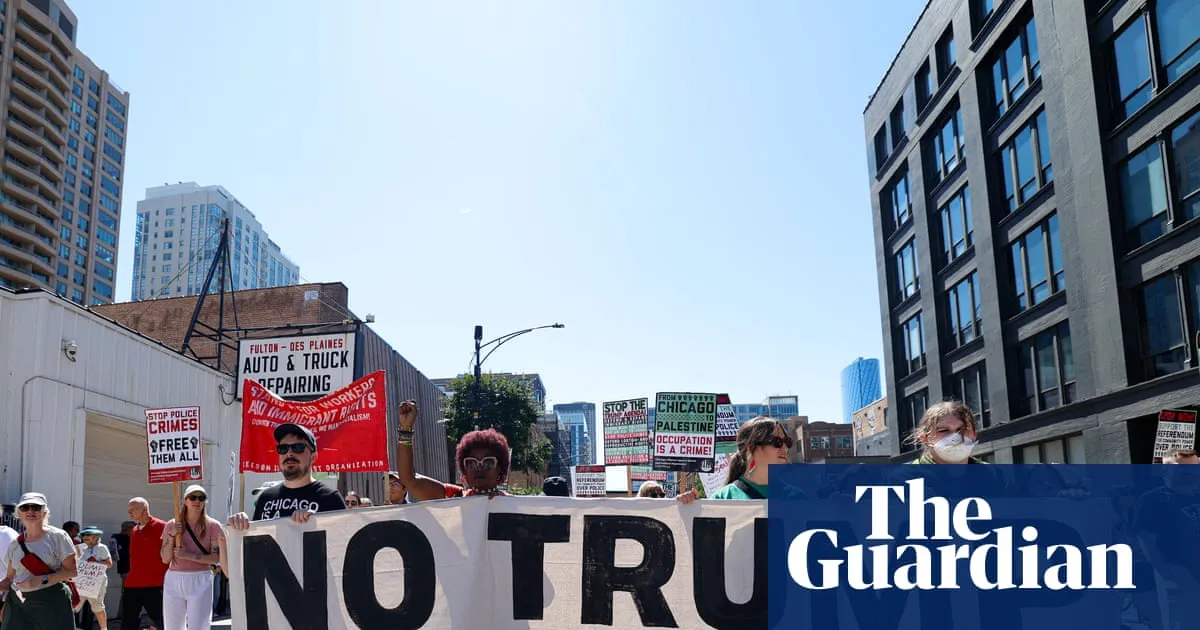
In recent days, federal law enforcement and ICE agents are reportedly preparing to make their presence felt in Chicago, a move that has left many communities on edge. This anticipated action marks the beginning of what could be a contentious chapter of federal policing in the Democratic-led city, stirring up significant debate among residents and officials alike.
On Tuesday, former President Donald Trump reiterated his pledge to send federal troops to Chicago, highlighting his belief that the city is a “hellhole” plagued by violence and homelessness. Trump indicated that regardless of local leadership's stance, he expects Chicago’s mayor, Brandon Johnson, and Illinois governor, JB Pritzker, to personally reach out for assistance. If this occurs, Chicago would follow Washington D.C. as the second U.S. city to receive National Guard troops under Trump's national crime emergency declaration.
Trump remarked, “We’re going in. I didn’t say when, but we’re going in.” This announcement follows a particularly violent Labor Day weekend in Chicago, during which nearly 60 individuals were shot, resulting in at least eight fatalities. Experts suggest that such incidents could serve as justification for deploying troops. Despite this, overall violent crime in Chicago has steadily decreased, reaching its lowest levels in decades, with murders between June and August totaling just 123.
Both Mayor Johnson and Governor Pritzker have consistently dismissed the right-wing narrative portraying Chicago as excessively crime-ridden and in dire need of federal intervention. In preparation for the impending arrival of federal troops, local leadership has begun informing residents. Reports suggest that federal troops could arrive as soon as this weekend, as outlined by the New York Times.
In response to Trump's threats, Johnson enacted the Protecting Chicago initiative at the end of August, an executive order designed to limit the influence of federal law enforcement on local policing. Despite speculation regarding the potential deployment of troops in other states like Louisiana, it appears Chicago remains the next focal point for military intervention.
Currently, an advance team of approximately 30 agents is undergoing training at Naval Station Great Lakes, focusing on crowd control and the use of flash grenades. Additionally, 230 agents, primarily from Customs and Border Protection, are being dispatched to Chicago from Los Angeles. During a recent press conference, Governor Pritzker expressed apprehension about ICE's potential targeting of events like the upcoming Mexican Independence Day festival, which has already been postponed due to fears of ICE operations.
Among those voicing concerns is Edwin Eisendrath, a former Chicago city council member and progressive political radio host. Eisendrath asserts that deploying the National Guard will not effectively address crime, citing a “historic lack of trust in the police” among Chicagoans. He emphasizes the importance of addressing root issues such as gun control and funding for violence-prevention programs instead.
Another resident, Sjonia Harper, who has lived in the historically Black neighborhood of Bronzeville for over 15 years, challenges the perception of her community as dangerous. She maintains that crime has not been a significant concern for her, highlighting that fear is not a part of her daily life. Harper also notes the racial dynamics at play, pointing out that Trump’s focus on cities led by Black officials could signal broader implications for communities of color.
John Orleans, a long-time resident of the West Side, echoes similar sentiments, advocating for increased investment and access to essential resources as a more effective crime reduction strategy than federal troop deployment. Orleans believes that enhancing neighborhood amenities leads to improved safety and community well-being.
Local organizations such as the Indivisible Chicago Alliance are mobilizing efforts to educate residents about their rights and prepare for potential federal actions. These groups are collaborating with the Illinois Coalition for Immigrant and Refugee Rights and the National Immigrant Justice Center to address threats posed by federal law enforcement. The National Lawyers Guild is also organizing legal observation teams to monitor interactions between the public and troops.
As Trump faces legal hurdles that could impede his plans for troop deployment, local leaders are advocating for community unity and awareness. Democratic congressional candidate Matt Conroy emphasizes the need to address the root causes of crime rather than resorting to heavy-handed tactics that could disproportionately affect Black and Hispanic communities. He argues that such actions serve more as a media spectacle than a genuine solution.
Denise Poloyac, a board member of the Indivisible Chicago Alliance, stresses the importance of community solidarity in the face of federal intervention. She encourages residents to engage in de-escalation tactics and to participate in organized actions, emphasizing that collective strength is crucial for navigating this challenging landscape.
As Chicago braces for the arrival of federal troops, the city's residents are determined to voice their concerns and advocate for a more equitable approach to public safety that prioritizes community engagement and resource allocation over militarized policing.